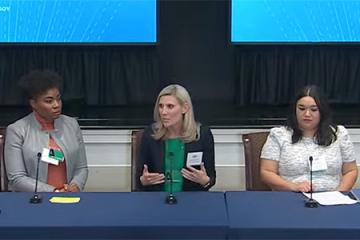Johns Hopkins University is providing $5 million in funding for six new programs that aim to create pathways for diverse students to enter non-STEM PhD programs. The funded programs aim to strengthen and broaden the pool of students who are prepared for and excited about doctoral education.
The Hopkins Pathways to PhD Programs Initiative solicited proposals from faculty throughout JHU for summer and post-baccalaureate programs that recruit and prepare students from diverse backgrounds to join non-STEM PhD programs. The creation of the Pathways to PhD Programs funding initiative, one of 24 goals articulated in The Second JHU Roadmap on Diversity, Equity, and Inclusion, offers centralized support for these new pathway programs as they, in turn, bolster support for students.
Like the Vivien Thomas Scholars Initiative, which recently brought 20 scholars from diverse backgrounds to Hopkins to study science, technology, engineering, and mathematics, the Pathways program uses an evidence-based model, in this case, to increase PhD applications and enrollment by introducing students—particularly those who attended colleges with less of a major research presence—to what doctoral level scholarship looks like.
"The literature is consistent that pathways programs are an evidence based approach to identify really talented students and let them know more about what graduate school is about, and excite them to want to consider that path," says Nancy Kass, Vice-Provost for Graduate and Professional Education. "We have had some amazing and successful pathways programs at JHU in STEM fields for years, but we are hoping that this initiative will jump start many such programs in other fields. We are thrilled that programs range from ones in music to ones in the humanities to ones in nursing and education."
The summer or post-baccalaureate pathway programs funded through this initiative will play a key role in providing students with opportunities to participate in supervised research, field work, course work, and/or scholarship. Each student experience will culminate in a mentored capstone, presentation, or thesis. Students also will benefit from dedicated mentorship and engagement with Hopkins PhD program faculty, as well as key programming to help demystify the PhD experience for students and provide them essential skills for navigating their future journeys in graduate education.
Students who enter these pathways programs will receive a stipend and tuition for programs providing coursework, as well as additional support for housing, health insurance, travel, and other costs.
Read more about the individual pathways programs below.
The SNF Agora Institute Predoctoral Fellowship Program
The SNF Agora Institute Predoctoral Fellowship Program seeks to recruit and enroll four fellows who are interested in pursuing a PhD in the SNF Agora Institute disciplines—currently political science, sociology, history, or philosophy—and who hail from diverse backgrounds. Fellows will spend one or two years at the SNF Agora Institute engaged in research, intellectual life, and scholarly preparation for PhD admissions through coursework or attending seminars and workshops across the university. The program will allow and ensure that fellows interact with world renowned Agora faculty. The program will include a mentoring component to introduce trainees to multiple disciplinary pathways to scholarly success and to prepare them to apply to PhD programs in their selected field.
Pathways to DMA
The Peabody Institute's Pathways to DMA Program will recruit diverse students to enroll as fully supported fellows in the Peabody Institute's Master of Music degree. In addition to completing the training and coursework required for their master's degree, these fellows will receive ancillary enrichment in three core competencies, essential as preparation for doctoral training: the ability to teach applied music, the ability to produce and manage a performance, and the academic skills necessary for success in a music doctoral program. Like all Peabody students, the Pathways fellows will have a major teacher and an adviser to guide their coursework, but they will also pair with a mentor teacher whom they will shadow during the instruction of other Peabody students. Pathways fellows will complete a capstone project for their MM degree (a recital for most performers and conductors or a portfolio for composers).
Krieger School Collaboratory PhD Pathway Program
The Collaboratory PhD Pathway Program is a substantial expansion of the Krieger School's Humanities Collaboratory, a longstanding summer undergraduate research program at Johns Hopkins. This new program will include an enriched, interdisciplinary 10-week summer research experience that provides extensive graduate school preparation and application workshops and a structured post-programming mentoring schedule that describes the graduate school application process and the life and lifecycle of PhD graduate studies. The program will recruit up to 10 students each year, primarily focusing on junior undergraduates enrolled in a historically Black college or university or minority-serving institution. This program will partner with the humanities and social science PhD programs in the Krieger School of Arts and Sciences and encourage pathways participants to apply to these or other PhD programs.
HSMT/MA Pathway to PhD in STEM-adjacent Humanities and Social Sciences
This two-year master's degree pathway program, hosted jointly by the Johns Hopkins Schools of Medicine and Krieger Arts and Sciences, will prepare students for PhD programs in STEM-adjacent humanities fields, specifically: History of Science, Medicine, and Technology; Science and Technology Studies; Anthropology; Sociology; and Classics, among others. Through guided training in academic writing, independent original research, professional development, and experience with graduate-level courses, the program will provide up to three students each year with the background, mentorship, and preparation necessary for succeeding at the PhD level. The program's core components include training in research methods and writing in year one and thesis writing in year two.
Post-bac/Graduate Research Edification and Preparedness for PhD in Education
The six-week Post-bac/graduate Research Edification & Preparedness for PhD in Education, or PREPPED, mentoring program in education research provides scholars from diverse backgrounds with the requisite skills in educational research to achieve doctoral studies admission. PREPPED scholars will have training in research methods and be paired with nationally renowned faculty members in the Johns Hopkins School of Education to study one of three areas of inquiry. Additionally, scholars will examine contemporary issues in education related to inequality, connect with doctoral students who serve as role models, attend seminars on social and cultural capital, and receive support for applying to doctoral programs.
Pathway to Nursing PhD Scholars Program
Outstanding nurses from diverse backgrounds will be recruited to become the next generation of nurse scientist-scholars through an intensive, eight-week accelerated summer course to prepare them for nursing PhDs. Supported by the Johns Hopkins School of Nursing and building on innovative pre-baccalaureate and predoctoral programs/partnerships, the program will provide mentorship, resources, networking, and career guidance alongside existing courses and seminars. Participants will also receive unique research opportunities overseen by the school's outstanding research faculty.
Posted in University News









